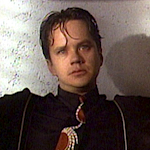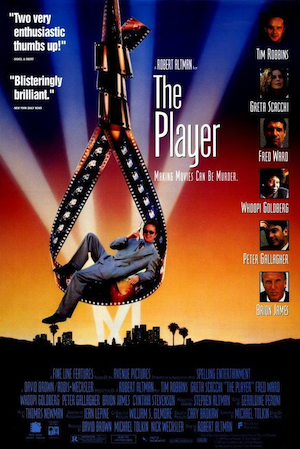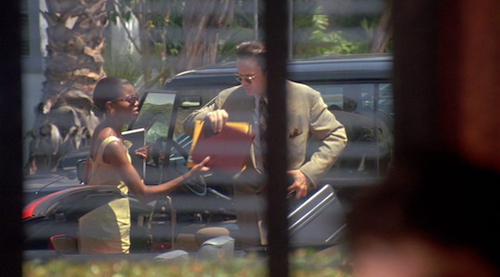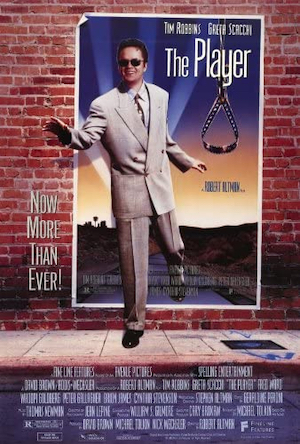 “It’s an art movie. Doesn’t count. I’m talkin about movie movies.”
“It’s an art movie. Doesn’t count. I’m talkin about movie movies.”
April 10, 1992
I have enjoyed some of Robert Altman’s movies over the years, but never became a full-on “he’s one of my favorites” convert like so many film buffs a little older than me. In fact the only ones I’ve ever reviewed are MCCABE & MRS. MILLER, POPEYE and NASHVILLE. POPEYE was definitely the first Altman movie I saw, since it starred my biggest childhood hero (not Robin Williams – Popeye). THE PLAYER was the first one I watched as a grown-ish person trying to see good movies for adults.
 I don’t hear people talk about it that much these days, but it has an 86 on Metacritic, which they quantify as “universal acclaim.” And it has a Criterion Edition. I remember it being viewed as a major cultural event in the film coverage I read in magazines and alternative weeklies of the time. In his review, Roger Ebert brought up Wall Street scandals and said the movie “uses Hollywood as a metaphor for the avarice of the 1980s,” but in my memory people enjoyed it as a satire of Hollywood executives. My most specific memory about it was a certain cameo in a movie-within-the-movie meant to parody the “pat Hollywood endings” joked about throughout the movie.
I don’t hear people talk about it that much these days, but it has an 86 on Metacritic, which they quantify as “universal acclaim.” And it has a Criterion Edition. I remember it being viewed as a major cultural event in the film coverage I read in magazines and alternative weeklies of the time. In his review, Roger Ebert brought up Wall Street scandals and said the movie “uses Hollywood as a metaphor for the avarice of the 1980s,” but in my memory people enjoyed it as a satire of Hollywood executives. My most specific memory about it was a certain cameo in a movie-within-the-movie meant to parody the “pat Hollywood endings” joked about throughout the movie.
The other thing I remembered was the then-very-famous opening tracking shot, which introduces us to many characters having ludicrous discussions at a fictional studio with the motto “MOVIES – now more than ever!” It all centers around Griffin Mill (Tim Robbins, TOY SOLDIERS, HOWARD THE DUCK, JUNGLE FEVER), senior vice president of production who fears he will soon be replaced by a new hire, Larry Levy (Peter Gallagher, SEX, LIES, AND VIDEOTAPE).
The dry humor in the movie largely comes from the inane things Griffin says to the writers and the desperate ways they try to pander to him, using all kinds of cliches and buzzwords to describe their projects. And most of them mention wanting Julia Roberts and/or Bruce Willis to star, except one writer who wants a cast of unknowns so he mentions not wanting Julia Roberts or Bruce Willis to star.
I believe one of the most famous parts of the movie (maybe because it was in the trailer) is Buck Henry, writer of THE GRADUATE, pitching THE GRADUATE PART II. At the time it was a hilarious joke about shamelessness in Hollywood, but now it just sounds like what we call a “legacy sequel.” And with that new context it actually doesn’t sound terrible. He wanted to reunite Dustin Hoffman, Anne Bancroft and Katherine Ross 25 years later to see where their characters were at and how things were different for their daughter as she graduated. That’s not so ridiculous. But I’m not of the generation who found great meaning in THE GRADUATE, so it’s not so sacrosanct to me. I was more bothered when they made CARRIE II and that turned out not so bad.
 The tracking shot lasts for 7 minutes and 47 seconds without any edits, even hidden ones. Altman jokily draws attention to it by introducing studio security chief Walter Stuckel (the great Fred Ward, who we just saw in THUNDERHEART) complaining, “Pictures these days are all MTV, cut cut cut cut. The opening shot of Welles’s TOUCH OF EVIL was six and a half minutes long!” He only knows old movies, though, so when a lowly assistant (Paul Hewitt, A PERFECT WORLD) gushes about “an extraordinary shot” in ABSOLUTE BEGINNERS, Walter says “I don’t know what the hell you’re talkin about.”
The tracking shot lasts for 7 minutes and 47 seconds without any edits, even hidden ones. Altman jokily draws attention to it by introducing studio security chief Walter Stuckel (the great Fred Ward, who we just saw in THUNDERHEART) complaining, “Pictures these days are all MTV, cut cut cut cut. The opening shot of Welles’s TOUCH OF EVIL was six and a half minutes long!” He only knows old movies, though, so when a lowly assistant (Paul Hewitt, A PERFECT WORLD) gushes about “an extraordinary shot” in ABSOLUTE BEGINNERS, Walter says “I don’t know what the hell you’re talkin about.”
Reportedly Altman did 15 takes and decided to use the tenth one. The camera moves around between a couple different buildings, intersecting with different characters moving in different directions and hearing their conversations, but maybe as impressive as that is that they planned the whole thing so that the main actors first appear at the same time as their credits come up. That cannot be easy to orchestrate. Good job Altman, director of photography Jean Lepine (HABITAT), and whoever else was involved in figuring that out.
What you might not know from the hype around the movie at the time or from what I’ve said so far is that it’s more of a thriller or neo-noir than a comedy. It’s written by Michael Tolkin (GLEAMING THE CUBE), based on his own novel, and it’s one of those “seemingly ordinary person discovers the evil they’re capable of” type stories, except the ordinary person is this powerful Hollywood asshole. At the end of that opening shot we learn that Griffin has been receiving anonymous threatening postcards. He has a drawer full of them. He plays them down, but they seem increasingly unhinged.
Griffin is dating a story editor he works with, Bonnie Sherow (introducing Cynthia Stevenson, later in AIR BUD: GOLDEN RECEIVER). She seems too nice for him, mainly there to give him humanity. It’s clear that in her mind they’re practically married, but he hasn’t even told her about his stalker, and when he wants her advice about it he pretends it’s a movie pitch he heard.
He determines that the postcards are coming from a writer named David Kahane (Vincent D’Onofrio, THE BLOOD OF HEROES) who he once met with but never got back to. So he gets the guy’s address and goes to confront him. He has a mobile phone, as only rich assholes like this guy did back then, so he calls the house from outside and watches through the windows as David’s girlfriend June Gudmundsdottir (Greta Scacchi, THE COCA-COLA KID) answers the phone.
I think this is my favorite scene. The camera stays outside the windows, and we only hear her voice distorted through the phone, so that it will feel uncomfortably voyeuristic. June is working on a painting and engages in a somewhat flirtatious conversation about herself for a few minutes. Not knowing she’s being watched she does things like pull an ice cube out of the freezer, suck on it for a second, and cool her armpit with it. Functionally it’s the introduction of a quirky, likable character, but since it’s shot like a reverse-perspective SCREAM opening it’s very creepy.
 It’s also part of a visual motif throughout the movie. That opening shot spies on people in their offices, through blinds. Later there’s a meeting where we see out the window as Griffin arrives late. When we see dailies from a movie-within-the-movie starring Scott Glenn and Lily Tomlin it’s from a scene also shot through a window. I don’t know what it means, but it’s interesting.
It’s also part of a visual motif throughout the movie. That opening shot spies on people in their offices, through blinds. Later there’s a meeting where we see out the window as Griffin arrives late. When we see dailies from a movie-within-the-movie starring Scott Glenn and Lily Tomlin it’s from a scene also shot through a window. I don’t know what it means, but it’s interesting.
June reveals that David is out seeing THE BICYCLE THIEF at the Rialto (also the theater in THE ROCKETEER, SCREAM 2 and LA LA LAND), so Griffin goes there and approaches David in the lobby (after first trying the wrong guy). It seems like authentic bullshit when he says, “It’s so refreshing to see something like this after all those cop movies, you know, that we make.” When he muses about remaking it David says, “You’d probly give it a happy ending.” That was the ultimate shorthand for Hollywood bullshit. A happy ending.
Griffin takes David for a drink, tries to apologize and give him a deal, but blows it by accidentally making it clear that he doesn’t remember what David’s script was about. During a drunken argument in the parking lot David accidentally knocks Griffin over a ledge, then tries to make sure he’s okay, and Griffin slams him face first in a puddle, killing him. Then he takes his wallet to make it look like a robbery gone wrong and tries to go back to his life.
In case you mistake him for a generally okay guy who fails a moral test under pressure, he goes ahead and goes to the funeral, talks to June, starts spending time with her, decides he loves her, brings her to an awards banquet while Bonnie is out of town, doesn’t tell Bonnie, when she finds out he takes June to Bonnie’s favorite resort, and then confesses killing David while having sex with her. In my opinion these are all poor choices.
But I’m getting ahead of myself. The morning after David’s death Walter knows all about what happened, but as head of studio security tries to keep it hush hush. Also, of course, the postcards keep coming. Whoops.
When Griffin’s at the funeral we see Lyle Lovett (in his first theatrically released film) watching him. It would be cool if he was playing himself, but instead he’s a detective named Paul DeLongpre. After he’s introduced it cuts to Griffin looking at a toy shark in June’s studio, and DeLongpre will proceed to silently follow him like a shark. And of course he will be seen through some windows.
Whenever I see Lovett in a movie I remember that he was once known as the guy who married Julia Roberts, and every hack comedian on TV had a joke about how he was too ugly to marry precious treasure Julia Roberts. I guess they actually met on the set of this movie, dated for three weeks and then eloped, before being married for less than two years. Anyway fuck those guys for calling him ugly. He’s so cool looking. I don’t know anything about his music but I’m excited any time he shows up in a movie.
The stalker suggests meeting at a hotel bar, but doesn’t show because he sees that Griffin is not alone – the writing team of Tom Oakley (Richard E. Grant, HUDSON HAWK) & Andy Sivella (Dean Stockwell, BEVERLY HILLS COP II) keep trying to pitch him a pretentious legal thriller called HABEUS CORPUS. I like that after ranting and raving about how it can’t have any known actors in it because “this story is too important to risk being overwhelmed by personality” and “we don’t want anyone coming in with any preconceived notions,” Oakley adds that, “If I’m perfectly honest, if I think about this, this isn’t even an American film.” This is funny shit and it shows that the people who are against the Hollywood bullshit aren’t necessarily correct either.
Griffin comes up with a scheme to convince Levy to make HABEUS CORPUS as an Oscar contender, then when the movie is a commercial disaster swoop in and “save” it with the “pat Hollywood ending” Oakley repeatedly said it wouldn’t have. (spoiler: It works, and Oakley seems to love the new ending more than anybody.)
 Since Altman was revered as a genius, everybody wanted to work with him, and he was able to populate his Hollywood with around 65 stars playing themselves. Griffin goes into a restaurant, introduces himself to Joel Grey, sees his rival having lunch with Anjelica Huston and John Cusack. He goes to hip restaurants and rich people parties, including one thrown by a friend named Dick Mellon, who’s played by Sydney Pollack. I swear this guy later changed his name to Victor Ziegler and hosted another party in EYES WIDE SHUT. It’s the same character.
Since Altman was revered as a genius, everybody wanted to work with him, and he was able to populate his Hollywood with around 65 stars playing themselves. Griffin goes into a restaurant, introduces himself to Joel Grey, sees his rival having lunch with Anjelica Huston and John Cusack. He goes to hip restaurants and rich people parties, including one thrown by a friend named Dick Mellon, who’s played by Sydney Pollack. I swear this guy later changed his name to Victor Ziegler and hosted another party in EYES WIDE SHUT. It’s the same character.
Famous people playing themselves include Harry and Shari Belafonte, Karen Black, James Coburn, Peter Falk, Sally Kellerman, Marlee Matlin, Jeff Goldblum (wearing a Cosby sweater and talking about GHOSTBUSTERS), Malcolm McDowell (who tells Griffin off), Jack Lemmon (playing a jazzy “Silent Night” on piano), and even Burt Reynolds (who calls Griffin an asshole). But of course a few actors have to play characters. Whoopi Goldberg plays a police detective, so they play with that by introducing her at the studio picking up an Oscar and pretending to accept it (Goldberg had won one for GHOST about a year earlier.)
People in Hollywood seem to love any decent movie about Hollywood. Could be a love letter, could be a hate letter, or a threatening postcard, doesn’t matter. To my ears the movie talk and and studio executive banter here seem a little more true than most movies like this. There are little random details, not overly explained to the audience. Walter brings up the movie D.O.A. as a comparison to Griffin’s situation, and his boss (Brion James, CRIMEWAVE) has to point out that it was remade by Disney. In a meeting he asks for “an update on the Taylor Hackford project.” Yeah, seems like this guy would be working on a Taylor Hackford project. We learn that DeLongpre is a fan of Tod Browning’s FREAKS. Maybe the unlikeliest bit of Hollywood minutia is that Griffin’s very first conversation in the movie is with Adam Simon, playing himself, aggressively pitching a sci-fi movie as he arrives at work and gets out of his car. Most people probly never heard of Adam Simon, but maybe he was getting lots of meetings off of his trippy 1990 debut BRAIN DEAD starring Bills Pullman and Paxton? He never got that greenlight from Griffin, because his next movie was CARNOSAUR. (He later wrote BONES and BOOKS OF BLOOD.)
I like that Griffin tries to use going to see THE BICYCLE THIEF to prove that he’s a real movie lover. David calls him on the fact that he came in five minutes before the ending. And yet the next day he brings it up as a way to seem cultured – even though it will link him to David’s murder! Doesn’t really play like a joke, but it’s funny.
Of course there’s also all the meta stuff. So much talk about happy endings. June talking about that criminals in movies “always have to suffer for their crimes.” When she says that “knowing that you committed a crime is suffering enough. If you don’t suffer, then maybe it wasn’t a crime after all” she has no idea she’s commenting on his actual situation or the ending of this movie, in which they get to live happily ever without suffering for their crimes. And the overblown music as the camera pulls out from their picturesque home makes it play like a movie-within-a-movie.
There’s also a scene where Levy argues that writers don’t matter because “the audience wrote” the ending to FATAL ATTRACTION that was changed after test screenings. Ironically it’s Griffin who adds a happy ending to his movie, HABEUS CORPUS.
![]() That brings me to the cameo I remembered. SPOILER I guess, though the Bruce icon here will give it away. When we finally see this movie they’ve been talking about, a tragic story where an innocent woman is executed “because that happens,” it’s now Julia Roberts playing the innocent woman, and Bruce Willis plays a hero who busts in when she’s in the
That brings me to the cameo I remembered. SPOILER I guess, though the Bruce icon here will give it away. When we finally see this movie they’ve been talking about, a tragic story where an innocent woman is executed “because that happens,” it’s now Julia Roberts playing the innocent woman, and Bruce Willis plays a hero who busts in when she’s in the electric chair gas chamber and carries her to freedom. Bruce does it just right, just playing it as a straight action movie, nothing comedic. Oh, and this was not meant as the same kind of crowdpleaser cameo, but it just so happens that Steve motherfuckin James plays one of the prison guards. So for now on it’s Steve James (THE PLAYER). Or I guess Steve James (HABEUS CORPUS).
THE PLAYER received Oscar nominations for best director, best adapted screenplay and best editing (losing to Clint Eastwood, HOWARD’S END and UNFORGIVEN, respectively). It won best director at the BAFTAs and Cannes, and Robbins won a Golden Globe, if that counts as an award.
When I first saw THE PLAYER I accepted the conventional wisdom that it was A Great Movie. Now, well… I think I still like it. It’s definitely an unusual mix, the dark thriller meets movie industry satire. But I think for me there’s something a little empty in the center, and it’s either Griffin or Robbins. I think it’s a good performance, lots of unsettling distant looks, good arrogance in pitch meetings, good shameless lying, effectively unreadable at times. But I think I might find the movie more compelling with a different type of charisma at the center.
Does he need to be broader? At times he’s a funny parody of a guy who’s full of shit, but the people around him are generally more full of shit. Griffin fumes and tells off Levy for arguing at a meeting that writers are overpaid and unnecessary. The interesting thing about the scene is that Griffin would have this argument while also sweating about the newspaper article about the manslaughter/murder he committed sitting on the table in front of him. But I guess maybe I would prefer a less complicated character here. He doesn’t need to occasionally be the one standing up for artistic integrity.
It’s okay that he’s a bastard – that is acceptable, maybe even preferable in a neo-noir. But I don’t really like that he’s such a cold, hollow guy from the beginning. I didn’t understand why Bonnie liked him so much. Maybe he used to be different. But June (who is not in the industry and doesn’t watch movies) has even less reason to like him, even setting aside it being a bizarre choice to hang out with the guy who she should know more than anybody very obviously murdered her boyfriend. “Oh, have you met Griffin? He’s a guy I met when he called asking where David was and then went to find David and then David was found murdered nearby.” Maybe from her choices at the end we can infer that she suspected more than she let on, but it’s a hard thing to accept while watching the movie.
Obviously Altman is a great director, but I think this is a blindspot of many dude directors of the ‘80s and ‘90s – creating these female characters who are very quirky and vibrant and have a strong presence (and of course are stunningly beautiful) and then assuming yeah, I’m sure she would instantly give over her life to this off-putting drip who’s the main character. No reason to question that.
(On the other hand, we’re certainly supposed to have the most sympathy for Bonnie, who Griffin totally screws over both in the relationship and in the job, and she’s the only one concerned that they sold out by changing the ending. So I’d say she’s a female character who’s mistreated by Griffin, but not by Altman.)
This is heresy, but when I read that Chevy Chase tried to get the role, I thought oh shit – that might’ve been better. I guess it would’ve been right after NOTHING BUT TROUBLE and instead of MEMOIRS OF AN INVISIBLE MAN so… generally not considered his artistic peak. I don’t know if he would’ve been able to pull it off. Would’ve been interesting, though.
Actually, you know who really might’ve worked as Griffin Mill? Bruce Willis. No joke. But then it would’ve been an American film.
Ah, I don’t know. I don’t totally know what to make of THE PLAYER, but I watched it twice for this review, and it kept me interested. I don’t really know another movie to compare it to, so it stands out, even in this weird summer.
Signs of the times:
While playing THE BICYCLE THIEF, the Rialto has up a poster for PEACE MAKER, the sci-fi movie with Robert Forster, from the director of WITCHBOARD and NIGHT OF THE DEMONS. I wonder if that’s what was actually showing at the time? Nah, more likely Altman was a fan.
Griffin and David have an argument in an alley plastered with posters for Van Halen, Skid Row, Megadeth, Guns ’n’ Roses and the movie DROP DEAD FRED. I’m assuming Altman is also a fan of those. This is like how directors now show off what they’re into by giving a character, like, a movie poster of THE THING or something. Altman was really into Skid Row.
This may change in time, but in my opinion the early ‘90s fashion is not very pleasant to look at. All these baggy suits. Ward and Lovett wear some ties that I kinda like, though.
Also released April 3, 1992:
FERNGULLY: THE LAST RAINFORST, NEWSIES, and SLEEPWALKERS. I would say the latter, directed by Mick Garris and “written directly for the scream” by Stephen King, is a good offering for Weird Summer. It’s about incestuous shapeshifting cat monsters and I thought it was laughable trash at the time but when I recently watched it as an adult I learned that I was a fuckin idiot back then because it’s a wonderfully crazy movie. Recommended, especially in the context of celebrating 1992 weirdness.
And DEEP COVER came out the next week. Like THE PLAYER, it was written by Michael Tolkin (well, he has a story credit) and has been released on blu-ray and DVD in the Criterion Collection. I’m sorry, I didn’t make time to revisit it for this series, but I can vouch for it. Here’s my (pretty low quality) review from 2004.



























May 19th, 2022 at 1:13 pm
It’s no POPEYE, that’s for sure!